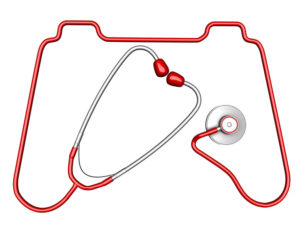 Have you heard of Ryan Crouser? Last week Ryan won a U.S. track and field Olympic gold medal throwing or putting a shot 22.52 meters. People like Ryan train and participate in the Olympics for the challenge, competition, and joy of the sport and the possibility of winning a medal. Through the Olympics Games, which are fun and inspiring to watch, we can share in the physical and mental accomplishments of the elite athletes.
Have you heard of Ryan Crouser? Last week Ryan won a U.S. track and field Olympic gold medal throwing or putting a shot 22.52 meters. People like Ryan train and participate in the Olympics for the challenge, competition, and joy of the sport and the possibility of winning a medal. Through the Olympics Games, which are fun and inspiring to watch, we can share in the physical and mental accomplishments of the elite athletes.
Games and health
While many people love playing and watching live sports, video games have a controversial reputation. We’ve all seen commercial images of kids sitting indoors playing video games instead of playing outdoors. In recent years, however, digital media are impacting health and fitness in beneficial ways. In the simplest form, fitness apps and personal health devices support healthy activity. There are also new digital health-related experiences called “exergaming”, which combines exercise and video gaming.
Gaming for health is not new. According to a recent publication by Mobihealth, a 1997 game designed to help children with Type 1 diabetes mellitus resulted in a significant reduction in urgent care visits. Studies with pre-op use of the video game, Super Mario Bros, show pre-op game playing decreases anxiety in children.
The Mayo Clinic Center for Innovation has an excellent March 16 blog post by Dr. Bernadette Keefe on the gamification of health care. According to Dr. Keefe, “the goals of gamification in health care would be to effect personal and societal behavioral change, to achieve improved individual health, and the health of populations.” Games can support behavior change by:
- Focusing attention
- Leveraging innate personal strengths
- Promoting commitment to attaining skills
As Dr. Keefe writes, “In essence, the games we play are a celebration of our potential, our dreams, and our innermost passions.”
Can gaming elicit a desired behavior?
Video games are big business. In the U.S., 175 million people play video games as part of a $22 billion industry. Worldwide an estimated 123 billion people spend $90 billion on video games. Dr. Keefe notes that games are universally transcendent in part because they create personal interaction and tap into the player’s passion and creativity. Key game features include:
- Player agency, which involves personal autonomy, action, and choice
- Game flow, characterized by absorption in the game activity which is bolstered by personal enjoyment (i.e., It’s fun!)
- A digital medium, with real-time interaction, feedback, and rewards fueling motivation
- Often, but not always, discrete game challenges and goals
The gaming sweet spot is a player environment with engagement and challenge, but not anxiety and frustration.
How can gaming improve health?
In 2007 the NEJM published an article by Steven Schroeder, “We Can Do Better – Improving the Health of the American People.” Dr. Schroeder notes that health outcomes are influenced by 5 domains: genetics, social circumstances, environmental exposures, behavioral patterns, and health care. Based on cause-of-death data in the U.S., behavioral patterns account for 40% of premature death while health care only influences 10% of premature deaths. Behavioral choices impact health outcomes more than genetics, medical care, and social circumstances.
Games developed to influence health behaviors have shown positive results. Health-related game features include:
- Focusing attention on meeting goals and challenges
- Documenting successes creating optimism for achieving goals like recovery from illness
- Providing choice and control to increase personal motivation
Gamification in health care seeks to leverage engagement, motivation, and reward. Specific game design and targeted use of games have resulted in successful health care gaming tools. The Mayo Clinic blog by Dr. Keefe highlights a number of health-related games, including a video game created by Jane McGonigal who suffered from a severe concussion. Dr. McGonigal, PhD, the Research Affiliate Chief Creative Officer at the Institute for the Future in Palo Alto, CA, created “Jane the Concussion Slayer” to facilitate her concussion recovery. She feels that games promote health by accessing and utilizing innate human strengths like:
- We are stronger than we know
- We are surrounded by allies and supporters
- We are the heroes of our own stories
Behavior change can be fun
Many examples show how fun games can influence and sustain changes for healthy behavior. One of my favorites is The Fun Theory creation of piano stairs next to an escalator in a train station in Sweden. The piano stairs with musical keys resulted in a 66% increase in people taking the stairs instead of the adjacent escalator. Check out the super cool piano stairs video at this link.
Gaming technology is used to support core health care activities including disease management, physical therapy, cognitive health, and nutrition. The Keefe Mayo Clinic blog includes excerpts from “Bandit’s Shark Showdown,” a robotics neuroscience game designed to assist in post-stoke rehabilitation. Business Insider recently highlighted many games that have educational, physical, and psychological attributes to support good health behaviors. These include driving video games that improve multi-tasking skills for older adults and Dance Dance Revolution, which has been used to increase physical activity for children. Studies show that kids who play sports video games are more likely to play the real games since they learn the rules and are able to visualize basic skills. Re-Mission is a video game used to enhance optimism and treatment adherence for cancer patients.
For additional examples of game designs and medical research collaborations check out the Gamification and Behavioral Design website.
Are you wearing your FitBit? Is it more fun to tell someone you walked a lot today or better to whip out your phone and show them your 10,000 steps? How does it feel to see a 1-week trend of meeting and exceeding your 10,000-step goal every day? Are you surpassing friends who are part of your FitBit group? Winning… that’s a big motivator.
 Dugan Maddux, MD, FACP, is the Vice President for CKD Initiatives for FMC-NA. Before her foray into the business side of medicine, Dr. Maddux spent 18 years practicing nephrology in Danville, Virginia. During this time, she and her husband, Dr. Frank Maddux, developed a nephrology-focused Electronic Health Record. She and Frank also developed Voice Expeditions, which features the Nephrology Oral History project, a collection of interviews of the early dialysis pioneers.
Dugan Maddux, MD, FACP, is the Vice President for CKD Initiatives for FMC-NA. Before her foray into the business side of medicine, Dr. Maddux spent 18 years practicing nephrology in Danville, Virginia. During this time, she and her husband, Dr. Frank Maddux, developed a nephrology-focused Electronic Health Record. She and Frank also developed Voice Expeditions, which features the Nephrology Oral History project, a collection of interviews of the early dialysis pioneers.




Leave a Reply